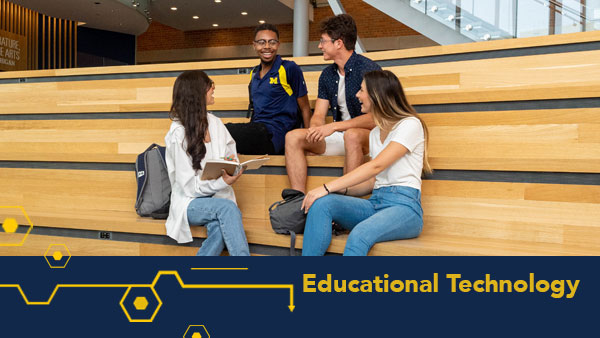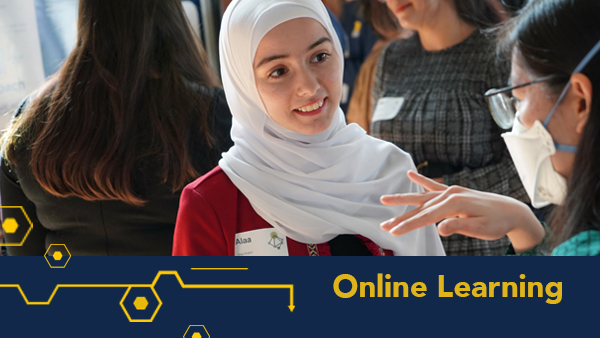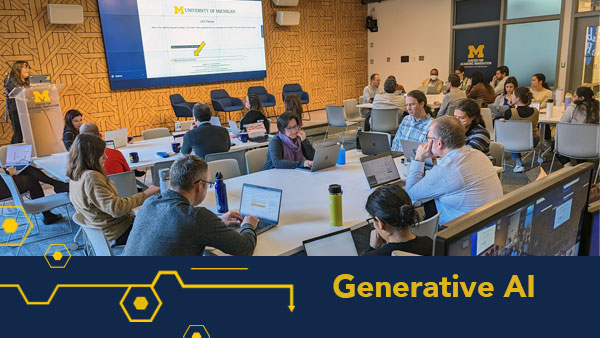Eric Joyce, Marketing Specialist
@ericmjoyce
On September 29th, President Schlissel invited the university community to further strengthen Michigan’s impact on society and help lead higher education through the information age with the announcement of the Academic Innovation Initiative. More than 200 faculty and members of the University of Michigan community heard remarks from university leaders and faculty innovators at the Alumni Center for the kickoff of the president’s new initiative.
This strategic initiative will foster a collaborative discussion among all members of the U-M community about the future of how the world learns from, and with, a public research institution and supports the university’s commitments to academic excellence, inclusion and innovation. President Schlissel and Provost and Executive Vice President for Academic Affairs Pollack have charged Academic Innovation to steward the initiative which will galvanize Academic Innovation’s commitment to enabling personalized, engaged and lifelong learning for the U-M community and learners worldwide.

“The Initiative will formally help us consider how the University of Michigan will lead the way for higher education through the information age,” said President Mark Schlissel during his remarks. “Academic Innovation is where creativity, excellence and impact all come together at the University of Michigan.”
He noted Michigan’s long-standing history of innovation as a transformative leader in higher education. New academic initiatives have enabled the university to reach global learners across society and this new initiative will leverage a legacy of academic excellence from U-M’s 19 colleges and schools as well as many institutes and centers to drive innovation throughout the University’s third century.
“There is simply no university better suited to advance the highest ideals of what a public research university should be,” said President Schlissel.
After the president’s remarks, a panel of faculty innovators including Dr. Elisabeth Gerber, Dr. Anita Gonzalez, Dr. Robert Jagers, Dr. Richard Meisler, and moderated by Dr. Timothy McKay, discussed their experience developing new innovations such as Wolverine Pathways and working directly with Academic Innovation’s three labs to launch new initiatives such as Policymaker, 19th Century Acts and MOOCs for Social Change including AIDS: Fear and Hope and Mass Incarceration in the U.S.: Toward Decarceration.
Dr. Meisler shared comments from learners in countries around the world including Australia, Indonesia, Mexico, Kazakhstan and the United Arab Emirates whom have benefited from access to HIV education provided by his AIDS: Fear and Hope MOOC.
“I learned that education can happen without most of the things we think of as necessities,” he said.
Dr. Anita Gonzalez explained how her initiative, 19th Century Acts, visualizes the historical biographies and live performances of Edwin Booth, Jenny Lind and Ira Aldridge while connecting learners at the University of Michigan with other students across the globe. She described how working with the Digital Education and Innovation Lab (DEIL) provided her with a new opportunity for personal growth.
“I learned and grew as an instructor and teacher by working with such an interdisciplinary team,” Gonzalez said.

Dr. Elisabeth Gerber shared similar experiences working with the Digital Innovation Greenhouse (DIG) to bring her hands-on role-playing simulation, Policymaker, to life.
“I’ve been able to combine my substantive knowledge with the technical program, design and user experience capabilities of the Academic Innovation team,” she said.
Policymaker is designed to enable educators to integrate classroom simulations into a variety of disciplines, topics and multiple educational levels.
These initiatives, and many others like them, were launched with the support of the Academic Innovation Fund (AIF). This partnership fund helps faculty innovators to design and develop teaching and learning initiatives that harness technology and learning analytics pursuant to the university’s focus to harness and lead innovation in 21st century education.

When asked to discuss his vision for the future of innovation, Dr. Robert Jagers said he is looking to expand Wolverine Pathways, a free, year-round program that partners with the families, schools, and communities to connect more middle school and high school students with U-M faculty and graduate students. One such expansion includes the integration of ECoach, another DIG initiative designed to provide students with personalized assistance in large classes, learn best practices, discover opportunities in areas of interest and avoid common pitfalls.
“We [will] think very seriously about the ECoaching opportunity and how to extend that further,” Jagers said.
Dr. Timothy McKay closed the panel discussion with a challenge to the U-M community: share more than 2,017 experiences, ideas or recommendations by the end of September 2017 with the Ideas2017 Challenge. These submissions will help Academic Innovation understand how to design the best academic environment for the third century of the University of Michigan as we continue the university’s legacy of public leadership and academic innovation leading to U-M’s Bicentennial Celebrations in September 2017. Add your contribution to the challenge.

Martha E. Pollack, Provost and Executive Vice President for Academic Affairs, discussed the evolution of Academic Innovation and how it contributes to the university’s mission by educating students on campus and connecting with global lifelong learners while advancing U-M’s social mission as a public university.
“This isn’t just about digital education and technology – it wraps into, and includes, all of our work on engaged learning,” she said. “[Academic Innovation] is impacting in a big way how we teach our students.”

James Hilton, Vice Provost for Academic Innovation and Dean of Libraries, discussed how new opportunities in innovation have renewed his optimism in higher education and invited the U-M community to reimagine the 21st century research institution.
He discussed how new opportunities driven by innovation are now available to keep students more “connected, engaged and relevant no matter where they are in the world and in their lives.”

Following remarks from university leadership, Academic Innovation hosted a reception inviting faculty and community partners to join in innovative exploration and experimentation through faculty-led design groups. These design groups follow themes of fostering broad and enduring participation at U-M, exploring innovation in the residential experience and creating catalysts for academic innovation.
All are invited to participate in the Academic Innovation Initiative. Ways to get involved include attending one of the many events, discussing and exploring the future of innovation in higher education, submitting your idea, experience or recommendation to the Ideas2017 Challenge and/or subscribing to our e-newsletter for insights from faculty innovators, a list of upcoming events and other updates from Academic Innovation.
To learn more about the Academic Innovation Initiative, watch the Kickoff event video:


